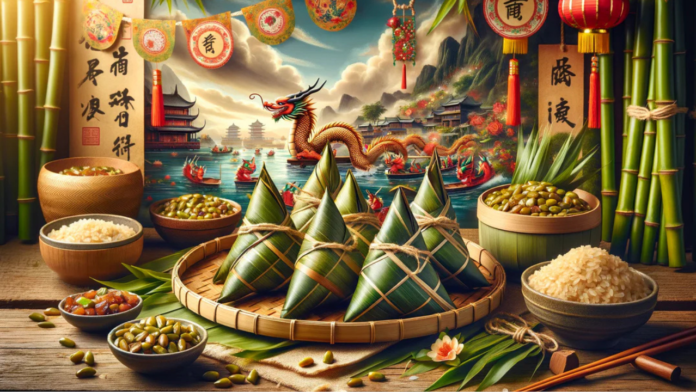The Dragon Boat Festival, or Duanwu Festival, is a lively festivity celebrated throughout China and several East Asian nations. Although the festival thrives with adrenaline-filled boat races, its traditional foods are just as beloved. Not only are these delicacies mouthwatering, they are deeply rooted in cultural symbolism of family unity, prosperity and respect for ancestors.
1. The Significance of Food in the Dragon Boat Festival
Much historical and cultural significance of Traditional Food at Dragon Boat Festival. Many of the dishes are associated with the legendary poet Qu Yuan, who is the reason for the festival’s origins. It is said that consuming these foods leads to good luck and prevents evil spirits.
2. Zongzi: The Star of the Festival
What is Zongzi?
Dragon Boat Festival Traditional food: Zongzi It contains sticky rice and bamboo leaf, and the inside is either sweet or salty.
Regional Variations of Zongzi
Northern China: Usually sweet, with fillings such as red bean paste or jujube.
Southern China: More often savory, stuffed with pork belly, salted egg yolk or mushrooms.
Southeast Asian Adaptations: You’ll find local variations in countries like Vietnam and Thailand.
Symbolic Meaning of Zongzi
Zongzi was also closely related to the story of Qu Yuan. People cast rice dumplings into the river to keep fishes from feeding on his body. Nowadays, the act of eating Zongzi signifies respect, memory, and unity.
3. Realgar Wine: A Traditional Protective Drink
What is Realgar Wine?
Aside from eating, this Dragon Boat Festival Traditional Food also drinks Realgar Wine (Xionghuangjiu). It is a yellow rice wine seasoned with realgar, a mineral believed to keep evil spirits and disease at bay.
Cultural and Medicinal Beliefs
Traditionally, people would spread realgar on children’s forehead and even write protective symbols to ward off ill-fates. Although its consumption has decreased from health issues related to the modern world, it remains a symbolic drink during the festival.
4. Other Festive Delicacies
Although Zongzi and Realgar Wine take the center stage of the festival’s menu, several other foods are enjoyed during the celebrations.
Eggs in Herbal Tea
- Boiled together with medicinal herbs for health and vitality.
- Often put into red mesh bags, which are hung around children’s necks as protection.
Salted Duck Eggs
- A delectable, flavour-rich treat that has an egg yolk — golden — at its core, which represents prosperity.
- Commonly used in Zongzi as a savory filling.
Five-Spice Beans
- These marinated broad beans, a popular snack believed to carry luck.
- In the Chinese culture, it represents the Five Elements (wood, fire, earth, metal, and water).
5. Modern Adaptations of Dragon Boat Festival Traditional Food
As food trends have shifted over the years, updated versions of traditional dishes have appeared:
- Healthier Zongzi made with quinoa or brown rice.
- Vegetarian and vegan options replacing pork and egg fillings.
- Creative flavors, such as chocolate or matcha Zongzi, catering to younger generations.
These advantages and more combine to make Dragon Boat Festival Traditional Food not just a meal, but a journey through history, myth, and culture. From the savoring of Zongzi to the spirited drink of Realgar Wine to the succulent salted duck eggs, each dish serves a purpose in this wonderful piece of literature about remembrance, protection and celebration. As the festival grows and changes, these beloved foods continue to be a defining aspect of the celebration, allowing traditions to carry into future generations.

